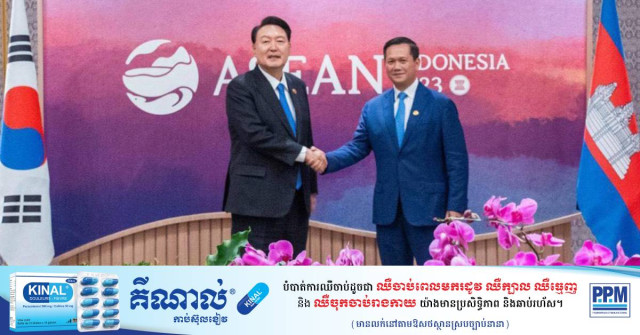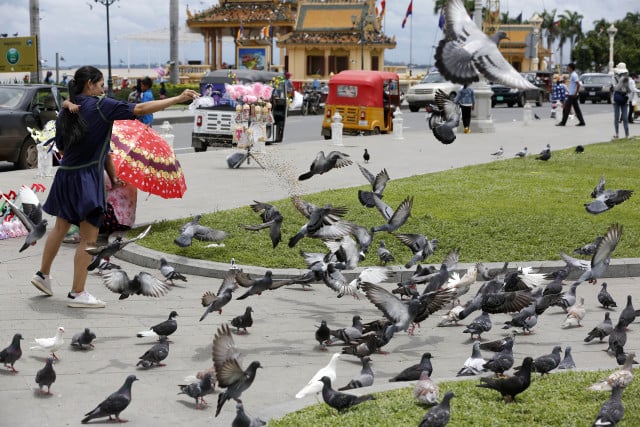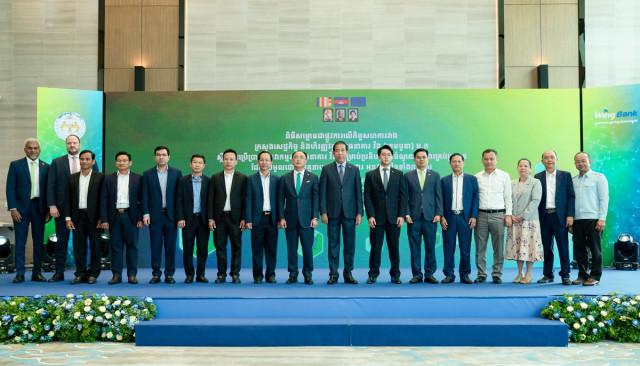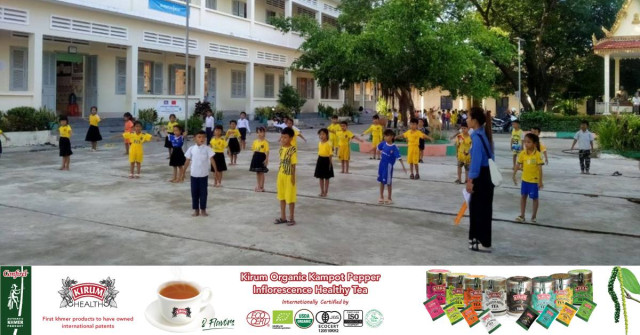Transnational Crime: A Cambodia–South Korea United Front

Cambodia and the Republic of Korea have maintained proficient communication and understanding, which can be seen in socio-economic pledges and the frequent exchange visits of the countries' leaders.
Since diplomatic relations were established in 2003, South Korean presidents have often visited Cambodia, including former presidents Roh Moo-hyun, Lee Myung-bak and Moon Jae-in, and current President Yoon Suk-yeol who came during Cambodia’s ASEAN Chairmanship.
Senior Cambodian leaders have also paid frequently visits to South Korea. In September 2021, the then foreign minister led delegations to visit South Korea and co-chair the 11th Mekong-ROK Foreign Minister Meeting, which was his second visit to South Korea.
In 2022, former prime minister Hun Sen visited South Korea and co-hosted the World Summit 2022. It concluded his eight visits to South Korea as PM.
Current Prime Minister Hun Manet is also planning to visit South Korea to strengthen ties and to attract more South Korean investors to the Kingdom.
Economic, business, investment, political cooperation and people-to-people exchanges will definitely top the agenda of the visit.
But the trip could also shed light on a new field of cooperation, possibly the most-needed one now, between Phnom Penh and Seoul – that is transnational crime, such as cybercrime, trafficking, online fraud and terrorism.
The recent announcement of a “terrorism alert” by Korea’s Ministry of Foreign Affairs, saying that North Korea is plotting to carry out a terrorist attack intended to hurt South Korean diplomats in five countries including Cambodia, is a wake-up call for both countries to place more emphasis on transnational crime.
Cambodia is becoming an attractive destination for South Korean investors as well as tourists. As of 2022, there were around 15,000 South Koreans living in Cambodia and around 300,000 South Korean tourists visit the kingdom annually.
Taking that into account, the fact that North Korea has histories of using terror as its means since the 1980s suggests that the prospect of protecting South Koreans in Cambodia became even more prominent.
While a terrorist attack is an occasional threat, cyber-attacks present an imminent risk to the Kingdom as well as the interest of the foreign national in Cambodia.
In January, the United Nations Office of Drugs and Crime (UNODC) revealed that North Korean hackers are involved in organized crimes in Mekong countries including Cambodia, Laos, Myanmar, Thailand, and Vietnam by getting involved in money-laundering and underground banking networks with online scammers and drug traffickers.
ROK–Cambodia cooperation will enable Cambodian law enforcement to identify any physical or cyber threat from North Korea or another crime syndicate.
This will be a win-win for South Korea and Cambodia. Phnom Penh will be able to locate and stop illegal cyber activities conducted on Cambodia while South Korea will be able to further decouple Pyongyang from acquiring illegal funds to fuel its adventuristic and aggressive missile programs.
The cooperation would be in the interest of the Cambodian government given the ambition to attract foreign investors to the country. For South Korea, having a good business environment that is secure from all sorts of fraud and cyber-attacks would aid businesses abroad handsomely.
Looking back at Cambodia, reducing taxes, and reducing red tape are in the government's line of sight while providing a safe and secure business environment for inbound investors are also extremely important. This is where the Cambodian law enforcement agencies should step in to tackle transnational crime, online fraud and other fraud in the Kingdom.
Apart from state-to-state benefits, the united effort between Seoul and Phnom Penh would also provide advantages on the systematic level.
This cooperation would be in line with the ROK's Indo-Pacific Strategy, which emphasizes counterterrorism and transnational challenges in its core lines of effort, moving Seoul from a passive to a proactive actor in Southeast Asia.
If North Korea were to carry out an attack in any of the countries, Seoul would have the upper hand to decouple small states, including Cambodia – which has traditional ties with Pyongyang, into its orbit.
For Cambodia on the regional level, cooperation with Seoul would draw ASEAN member states’ attention to the ASEAN Counter-Terrorism Convention while – on the state level – the Kingdom will attract further technical development, support, and effort against crime in cyberspace.
With these mutually perceived advantages, the ROK and Cambodia should pursue this focus on two aspects. In one aspect, there should be an increase and constant communication between the law enforcement agencies of the two countries.
Intelligence sharing, surveillance, and other information relating to cybercrime, terrorism, and transnational crime would play a vital role as a start.
South Korea showed its advanced technological capabilities when the ROK National Intelligence Service detected the possible attacks from North Korea.
For Cambodia, obtaining technical assistance, support, and training from South Korea would undermine terrorism and illicit cyber activities and amp up the anti-terrorist unit. Koreans, currently in the Kingdom, would be even more secure and safe with the South Korean and Cambodian governments jointly tackle the pressing issues.
Looking at history, the most recent act of violence perpetrated in Southeast Asia by the regime was suspected to be in 2017 with the assassination of Kim Jong-nam – the half-blood brother of Kim Jong-un – in Malaysia with VX nerve agent.
Many believed that the assassination was related to the need for Kim Jong-un to expunge potential rivals to his rule. After this incident, relations between Kuala Lumpur and Pyongyang took a severe dive.
With this, and considering the recent South Korea–Cuba diplomatic ties establishment, North Korea has few partners. Therefore, unless there is a strong motive to eliminate the threat to rule, like Kim Jong-nam's case in 2017, Pyongyang will be less likely to pursue another act that would decouple the regime even further from Southeast Asia.
However, the region, especially Cambodia, Vietnam, and Laos, must remain alert and communicative with Seoul for the time being to ensure there is no unwanted incident.
Overall, the recent possible North Korea terrorist attack on South Korean diplomats in Cambodia and other countries indicates an urgency for Phnom Penh and Seoul to work together on traditional and non-traditional security issues.
Given the recent North Korean terrorist alert, the Cambodian government should take this chance to express its commitment to provide safety to South Korean diplomats as well as maintain close communication with the South Korean government to prevent North Korea from carrying out terrorist attacks in Cambodia.
It expresses Cambodia’s goodwill to work with South Korea on this issue. Their cooperation would not only deter the attack in the present but will also benefit both countries in the long run.
Bunly EK is a 2022 Global Korea Scholarship (GKS) Scholar at Yonsei University and a Research Fellow at the Cambodian Center for Regional Studies (CCRS). His focus is on East Asia, Southeast Asia, and International Security.
Sokvy Rim is a research fellow at the Cambodian Center for Regional Study. His research interests focus on Cambodia's foreign policy and its engagement with Southeast Asian and East Asia countries.

















